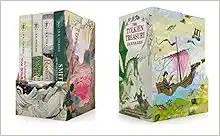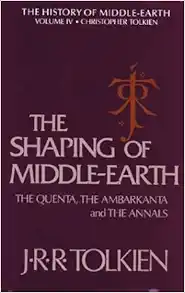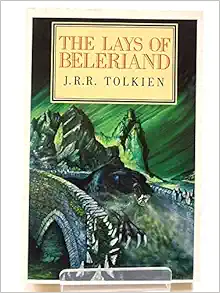
The Return of the King (The Lord of the Rings, Part 3)
Mass Market Paperback – July 12, 1986
Description
“There are very few works of genius in recent literature. This is one.” —The Nation From the Inside Flap THE GREATEST FANTASY EPIC OF OUR TIME While the evil might of the Dark Lord Sauron swarmed out to conquer all Middle-earth, Frodo and Sam struggled deep into Mordor, seat of Sauron's power. To defeat the Dark Lord, the accursed Ring of Power had to be destroyed in the fires of Mount Doom. But the way was impossibly hard, and Frodo was weakening. Weighed down by the compulsion of the Ring he began finally to despair. The awesome conclusion of J.R.R. Tolkien's "The Lord of the Rings, beloved by millions of readers around the world. THE GREATEST FANTASY EPIG OF OUR TIME While the evil might of the Dark Lord Sauron swarmed out to conquer all Middle-earth, Frodo and Sam struggled deep into Mordor, seat of Sauron's power. To defeat the Dark Lord, the accursed Ring of Power had to be destroyed in the fires of Mount Doom. But the way was impossibly hard, and Frodo was weakening. Weighed down by the compulsion of the Ring, he began finally to despair. THE AWESOME CONCLUSION OF J.R.R. TOLKIEN'S THE LORD OF THE RINGS, BELOVED BY MILLIONS OF READERS AROUND THE WORLD. John Ronald Reuel Tolkien was born on January 3, 1892, in Bloemfontein, South Africa. After serving in World War I, he embarked upon a distinguished academic career and was recognized as one of the finest philologists in the world. He was a professor of Anglo-Saxon at Oxford, a fellow of Pembroke College, and a fellow of Merton College until his retirement in 1959. He is, however, beloved throughout the world as the creator of Middle-earth and author of such classic works as The Hobbit and The Lord of the Rings . He died on September 2, 1973, at the age of eighty-one. Excerpt. © Reprinted by permission. All rights reserved. MINAS TIRITH Pippin looked out from the shelter of Gandalf’s cloak. He wondered if he was awake or still sleeping, still in the swift-moving dream in which he had been wrapped so long since the great ride began. The dark world was rushing by and the wind sang loudly in his ears. He could see nothing but the wheeling stars, and away to his right vast shadows against the sky where the mountains of the South marched past. Sleepily he tried to reckon the times and stages of their journey, but his memory was drowsy and uncertain. There had been the first ride at terrible speed without a halt, and then in the dawn he had seen a pale gleam of gold, and they had come to the silent town and the great empty house on the hill. And hardly had they reached its shelter when the winged shadow had passed over once again, and men wilted with fear. But Gandalf had spoken soft words to him, and he had slept in a corner, tired but uneasy, dimly aware of comings and goings and of men talking and Gandalf giving orders. And then again riding, riding in the night. This was the second, no, the third night since he had looked in the Stone. And with that hideous memory he woke fully, and shivered, and the noise of the wind became filled with menacing voices. A light kindled in the sky, a blaze of yellow fire behind dark barriers. Pippin cowered back, afraid for a moment, wondering into what dreadful country Gandalf was bearing him. He rubbed his eyes, and then he saw that it was the moon rising above the eastern shadows, now almost at the full. So the night was not yet old and for hours the dark journey would go on. He stirred and spoke. ‘Where are we, Gandalf?’ he asked. ‘In the realm of Gondor,’ the wizard answered. ‘The land of Anórien is still passing by.’ There was a silence again for a while. Then, ‘What is that?’ cried Pippin suddenly, clutching at Gandalf’s cloak. ‘Look! Fire, red fire! Are there dragons in this land? Look, there is another!’ For answer Gandalf cried aloud to his horse. ‘On, Shadowfax! We must hasten. Time is short. See! The beacons of Gondor are alight, calling for aid. War is kindled. See, there is the fire on Amon Dîn, and flame on Eilenach; and there they go speeding west: Nardol, Erelas, Min-Rimmon, Calenhad, and the Halifirien on the borders of Rohan.’ But Shadowfax paused in his stride, slowing to a walk, and then he lifted up his head and neighed. And out of the darkness the answering neigh of other horses came; and presently the thudding of hoofs was heard, and three riders swept up and passed like flying ghosts in the moon and vanished into the West. Then Shadowfax gathered himself together and sprang away, and the night flowed over him like a roaring wind. Pippin became drowsy again and paid little attention to Gandalf telling him of the customs of Gondor, and how the Lord of the City had beacons built on the tops of outlying hills along both borders of the great range, and maintained posts at these points where fresh horses were always in readiness to bear his errand-riders to Rohan in the North, or to Belfalas in the South. ‘It is long since the beacons of the North were lit,’ he said; ‘and in the ancient days of Gondor they were not needed, for they had the Seven Stones.’ Pippin stirred uneasily. ‘Sleep again, and do not be afraid!’ said Gandalf. ‘For you are not going like Frodo to Mordor, but to Minas Tirith, and there you will be as safe as you can be anywhere in these days. If Gondor falls, or the Ring is taken, then the Shire will be no refuge.’ ‘You do not comfort me,’ said Pippin, but nonetheless sleep crept over him. The last thing that he remembered before he fell into deep dream was a glimpse of high white peaks, glimmering like floating isles above the clouds as they caught the light of the westering moon. He wondered where Frodo was, and if he was already in Mordor, or if he was dead; and he did not know that Frodo from far away looked on that same moon as it set beyond Gondor ere the coming of the day. Pippin woke to the sound of voices. Another day of hiding and a night of journey had fleeted by. It was twilight: the cold dawn was at hand again, and chill grey mists were about them. Shadowfax stood steaming with sweat, but he held his neck proudly and showed no sign of weariness. Many tall men heavily cloaked stood beside him, and behind them in the mist loomed a wall of stone. Partly ruinous it seemed, but already before the night was passed the sound of hurried labour could be heard: beat of hammers, clink of trowels, and the creak of wheels. Torches and flares glowed dully here and there in the fog. Gandalf was speaking to the men that barred his way, and as he listened Pippin became aware that he himself was being discussed. ‘Yea truly, we know you, Mithrandir,’ said the leader of the men, ‘and you know the passwords of the Seven Gates and are free to go forward. But we do not know your companion. What is he? A dwarf out of the mountains in the North? We wish for no strangers in the land at this time, unless they be mighty men of arms in whose faith and help we can trust.’ ‘I will vouch for him before the seat of Denethor,’ said Gandalf. ‘And as for valour, that cannot be computed by stature. He has passed through more battles and perils than you have, Ingold, though you be twice his height; and he comes now from the storming of Isengard, of which we bear tidings, and great weariness is on him, or I would wake him. His name is Peregrin, a very valiant man.’ ‘Man?’ said Ingold dubiously, and the others laughed. ‘Man!’ cried Pippin, now thoroughly roused. ‘Man! Indeed not! I am a hobbit and no more valiant than I am a man, save perhaps now and again by necessity. Do not let Gandalf deceive you!’ ‘Many a doer of great deeds might say no more,’ said Ingold. ‘But what is a hobbit?’ ‘A Halfling,’ answered Gandalf. ‘Nay, not the one that was spoken of,’ he added seeing the wonder in the men’s faces. ‘Not he, yet one of his kindred.’ ‘Yes, and one who journeyed with him,’ said Pippin. ‘And Boromir of your City was with us, and he saved me in the snows of the North, and at the last he was slain defending me from many foes.’ ‘Peace!’ said Gandalf. ‘The news of that grief should have been told first to the father.’ ‘It has been guessed already,’ said Ingold; ‘for there have been strange portents here of late. But pass on now quickly! For the Lord of Minas Tirith will be eager to see any that bear the latest tidings of his son, be he man or—’ ‘Hobbit,’ said Pippin. ‘Little service can I offer to your lord, but what I can do, I would do, remembering Boromir the brave.’ ‘Fare you well!’ said Ingold; and the men made way for Shadowfax, and he passed through a narrow gate in the wall. ‘May you bring good counsel to Denethor in his need, and to us all, Mithrandir!’ Ingold cried. ‘But you come with tidings of grief and danger, as is your wont, they say.’ ‘Because I come seldom but when my help is needed,’ answered Gandalf. ‘And as for counsel, to you I would say that you are over-late in repairing the wall of the Pelennor. Courage will now be your best defence against the storm that is at hand—that and such hope as I bring. For not all the tidings that I bring are evil. But leave your trowels and sharpen your swords!’ ‘The work will be finished ere evening,’ said Ingold. ‘This is the last portion of the wall to be put in defence: the least open to attack, for it looks towards our friends of Rohan. Do you know aught of them? Will they answer the summons, think you?’ ‘Yes, they will come. But they have fought many battles at your back. This road and no road looks towards safety any longer. Be vigilant! But for Gandalf Stormcrow you would have seen a host of foes coming out of Anórien and no Riders of Rohan. And you may yet. Fare you well, and sleep not!’ Read more
Features & Highlights
- The awesome conclusion to The Lord of the Rings—the greatest fantasy epic of all time—which began in
- The Fellowship of the Ring
- and
- The Two Towers
- .
- Nominated as one of America’s best-loved novels by PBS’s
- The Great American Read
- While the evil might of the Dark Lord Sauron swarms out to conquer all Middle-earth, Frodo and Sam struggle deep into Mordor, seat of Sauron’s power. To defeat the Dark Lord, the One Ring, ruler of the accursed Rings of Power, must be destroyed in the fires of Mount Doom. But the way is impossibly hard, and Frodo is weakening. Weighed down by the compulsion of the Ring, he begins finally to despair.




